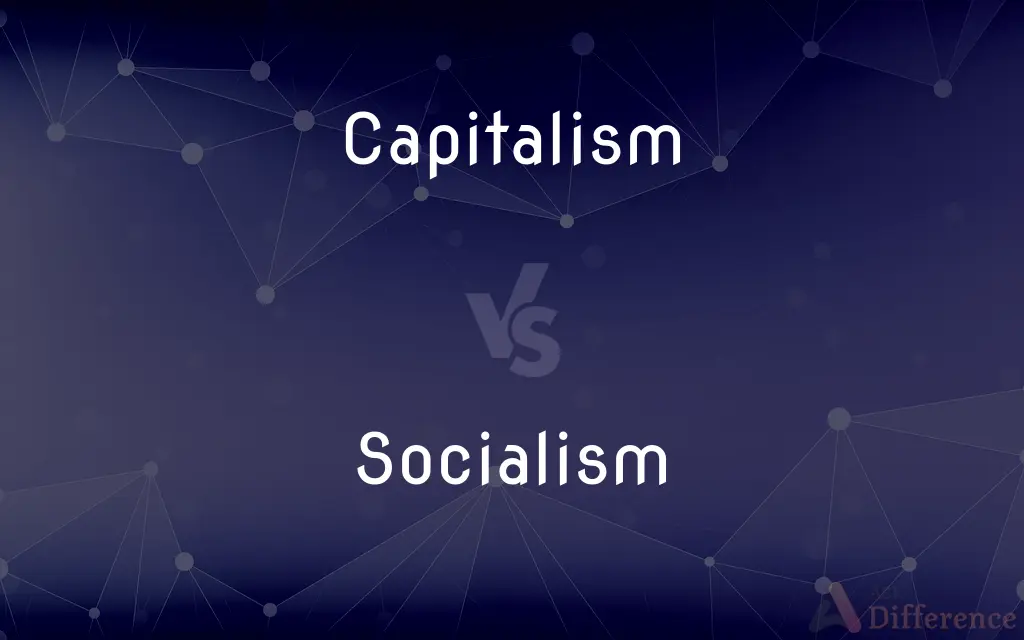Capitalism vs. Socialism — What's the Difference?
Edited by Tayyaba Rehman — By Maham Liaqat — Updated on March 24, 2024
Capitalism emphasizes private ownership and market freedom, while socialism advocates for collective ownership and wealth distribution.

Difference Between Capitalism and Socialism
Table of Contents
ADVERTISEMENT
Key Differences
Capitalism is an economic system where trade, industry, and the means of production are largely or entirely owned by private individuals or corporations, aiming for profit. The principles of supply and demand in free markets primarily guide economic decisions, including what to produce, how to produce it, and for whom. In contrast, socialism is an economic framework where the state, representing the community, controls the means of production, distribution, and exchange with the goal of redistributing wealth more equitably among citizens. This system emphasizes minimizing economic inequalities through mechanisms such as wealth redistribution, provision of social services, and public ownership of significant industries.
Under capitalism, the motivation for individuals and businesses to innovate and improve efficiency is driven by the potential for profit. This competitive nature is credited with fostering innovation, economic growth, and consumer choice. Conversely, socialism advocates argue that their system reduces the disparities in wealth and ensures that basic needs, such as healthcare and education, are met for all, arguing that these should not be left to the unpredictability of market forces. They contend that the collective or state control over resources leads to a fairer distribution of goods and services.
Capitalism is characterized by the unequal distribution of wealth and resources, which its proponents argue is a result of differences in ambition, talent, and effort. They believe that this inequality is a driving force for economic development and innovation. On the other hand, socialism seeks to reduce or eliminate this inequality through various forms of wealth redistribution, such as taxes on the wealthy and public services for all, leading to a more uniform distribution of wealth and resources.
The role of the government under capitalism is limited to protecting property rights, enforcing contracts, and ensuring national defense, operating under the belief that markets should be as free as possible from government intervention. Socialism, however, entails a significant role for the government in managing the economy, including planning and directing production and distribution, to ensure that the community's needs are met.
Capitalism and socialism also differ in their perspectives on individual rights and societal goals. Capitalism prioritizes individual freedoms, especially in economic activities, allowing individuals to choose their career paths, what to consume, and where to invest. Socialism places a greater emphasis on achieving equality and meeting collective needs, sometimes at the expense of certain individual freedoms, with the belief that the state is better positioned to make decisions regarding production and distribution for the benefit of society as a whole.
ADVERTISEMENT
Comparison Chart
Ownership
Private individuals and corporations
Collective or state ownership
Economic Decision
Market forces (supply and demand)
Central planning
Objective
Profit maximization
Wealth redistribution and equality
Role of Government
Limited to protection of property and contracts
Extensive in economic planning and distribution
Distribution of Wealth
Unequal, based on market outcomes
Aimed at equality through redistribution
Compare with Definitions
Capitalism
Economic system based on private ownership and market freedom.
In capitalism, businesses compete freely with minimal government interference.
Socialism
Central planning dictates economic decisions and production.
In socialism, the government decides what is produced based on societal needs.
Capitalism
Government role is to ensure market freedom and protect property rights.
In a capitalist system, the government enforces contracts and property laws.
Socialism
Government plays a significant role in economic management and welfare provision.
Socialist governments provide healthcare, education, and welfare to all citizens.
Capitalism
Wealth and resources are distributed unevenly, based on market dynamics.
Capitalism leads to wealth accumulation for those who are successful in the market.
Socialism
Economic system advocating for collective or state ownership and distribution.
Socialism aims to distribute resources equitably, managed by the state.
Capitalism
Emphasizes individual rights and freedoms in economic activities.
Capitalism allows individuals to decide what to produce based on market demand.
Socialism
Aims for a more equitable distribution of wealth and resources.
Socialism strives to ensure that all citizens have access to basic necessities.
Capitalism
Characterized by profit-driven motives and competition.
Capitalist economies thrive on innovation driven by the pursuit of profit.
Socialism
Focuses on reducing economic inequalities through wealth redistribution.
Socialist policies include high taxes on the wealthy to fund public services.
Capitalism
An economic system based on private ownership of capital
Socialism
Socialism is a political, social, and economic philosophy encompassing a range of economic and social systems characterised by social ownership of the means of production. It includes the political theories and movements associated with such systems.
Capitalism
Capitalism is an economic system based on the private ownership of the means of production and their operation for profit. Central characteristics of capitalism include capital accumulation, competitive markets, a price system, private property and the recognition of property rights, voluntary exchange and wage labor.
Socialism
Any of various theories or systems of social organization in which the means of producing and distributing goods is owned collectively or by a centralized government that often plans and controls the economy.
Capitalism
An economic system in which the means of production and distribution are privately or corporately owned and development occurs through the accumulation and reinvestment of profits gained in a free market.
Socialism
The stage in Marxist-Leninist theory intermediate between capitalism and communism, in which the means of production are collectively owned but a completely classless society has not yet been achieved.
Capitalism
(politics) A socio-economic system based on private ownership of resources or capital.
Socialism
Any of various economic and political theories advocating collective or governmental ownership and administration of the means of production and distribution of goods.
Capitalism
(economics) An economic system based on private ownership of the means of production and their operation for profit.
Socialism
A system of social and economic equality in which there is no private property.
Capitalism
A socio-economic system based on private property rights, including the private ownership of resources or capital, with economic decisions made largely through the operation of a market unregulated by the state.
Socialism
A system or condition of society in which the means of production are owned and controlled by the state.
Capitalism
An economic system based on the abstraction of resources into the form of privately owned capital, with economic decisions made largely through the operation of a market unregulated by the state.
Socialism
(Marxism-Leninism) The intermediate phase of social development between capitalism and communism in Marxist theory in which the state has control of the means of production.
Capitalism
An economic system based on predominantly private (individual or corporate) investment in and ownership of the means of production, distribution, and exchange of goods and wealth; contrasted with socialism or especially communism, in which the state has the predominant role in the economy.
Socialism
Any of a group of later political philosophies such democratic socialism and social democracy which do not envisage the need for full state ownership of the means of production nor transition to full communism, and which are typically based on principles of community decision making, social equality and the avoidance of economic and social exclusion, with economic policy giving first preference to community goals over individual ones.
Socialism
Any left-wing ideology, government regulations, or policies promoting a welfare state, nationalisation, etc.
Socialism
A theory or system of social reform which contemplates a complete reconstruction of society, with a more just and equitable distribution of property and labor. In popular usage, the term is often employed to indicate any lawless, revolutionary social scheme. See Communism, Fourierism, Saint-Simonianism, forms of socialism.
[Socialism] was first applied in England to Owen's theory of social reconstruction, and in France to those also of St. Simon and Fourier . . . The word, however, is used with a great variety of meaning, . . . even by economists and learned critics. The general tendency is to regard as socialistic any interference undertaken by society on behalf of the poor, . . . radical social reform which disturbs the present system of private property . . . The tendency of the present socialism is more and more to ally itself with the most advanced democracy.
We certainly want a true history of socialism, meaning by that a history of every systematic attempt to provide a new social existence for the mass of the workers.
Socialism
A political theory advocating state ownership of industry
Socialism
An economic system based on state ownership of capital
Common Curiosities
Can capitalism lead to economic inequality?
Yes, capitalism can result in economic inequality due to its market-based distribution of wealth.
What defines capitalism?
Capitalism is defined by private ownership, market freedom, and profit motivation.
How does socialism redistribute wealth?
Socialism redistributes wealth through taxes, public services, and collective ownership.
What role does the government play in socialism?
In socialism, the government has an extensive role in economic planning and distribution.
How do capitalism and socialism differ in their approach to economic decisions?
Capitalism relies on market forces, while socialism uses central planning for economic decisions.
How does capitalism promote innovation?
Capitalism fosters innovation through competition and the profit motive.
Does socialism restrict individual freedoms?
Socialism may limit certain economic freedoms in favor of collective welfare and equality.
Do socialist systems have private businesses?
While private businesses can exist in socialism, major industries are often owned or controlled by the state.
Is healthcare privatized in capitalism?
Typically, yes, healthcare can be privatized in capitalism, with services offered through the market.
What is the primary goal of capitalism?
The primary goal of capitalism is profit maximization and economic growth.
Can socialism ensure equal access to resources?
Socialism aims to ensure equal access by redistributing wealth and providing public services.
Can a country have elements of both capitalism and socialism?
Yes, many countries implement mixed economies, incorporating elements of both capitalism and socialism.
How does each system affect consumer choice?
Capitalism typically offers more consumer choice through market diversity, whereas socialism focuses on meeting basic needs, potentially limiting choice.
What is a key benefit of socialism?
A key benefit of socialism is the reduction of economic disparities and provision of basic needs for all.
How are resources allocated in a capitalist economy?
In capitalism, resources are allocated based on supply and demand dynamics.
Share Your Discovery

Previous Comparison
Hooch vs. Moonshine
Next Comparison
Signs vs. SymptomsAuthor Spotlight
Written by
Maham LiaqatEdited by
Tayyaba RehmanTayyaba Rehman is a distinguished writer, currently serving as a primary contributor to askdifference.com. As a researcher in semantics and etymology, Tayyaba's passion for the complexity of languages and their distinctions has found a perfect home on the platform. Tayyaba delves into the intricacies of language, distinguishing between commonly confused words and phrases, thereby providing clarity for readers worldwide.














































